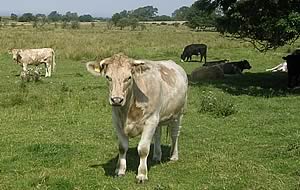22/09/06
Cattle producers are being urged to plan their pneumonia management
protocols early this year because of vaccine limitations and restricted
disease treatment options.
 |
“Pneumonia is a very complex disease caused by viruses,
bacteria and mycoplasmas. And as it is not possible to eradicate
many of the pathogens that cause pneumonia, the risk of a disease
outbreak is ever present,” cautions Schering-Plough Animal
Health livestock veterinary adviser Andrew Montgomery.
“Vaccination is a sound prevention measure for some production
systems, but will not prevent all outbreaks. For example, there
is no vaccine available for pneumonia caused by the bacterial pathogens
H.somni and P. multocida,” he points out.
“If your unit does suffer from pneumonia problems do get
your vet to do some investigation to try and identify the causal
pathogens. That will help you decide if vaccination is the best
control option,” he advises.
Most farmers tend to rely on antibiotics to get them through pneumonia
outbreaks, but Andrew Montgomery suggests it’s worth making
sure your antibiotic of choice is effective against all of the
major bacterial causes of the disease, including H. somni and P.
multocida. “Either check the label, or contact your vet to
be absolutely sure,” he says.
Pneumonia management issues are further complicated this coming
season by the fact that the range of antibiotics farmers can administer
to cattle themselves has now been restricted. Following the deaths
of two farmers in the USA after accidental self-injection, the
pneumonia treatment containing tilmicosin can now only be injected
by a veterinary surgeon.
“The tilmicosin restriction leaves some UK farmers looking
for a trusted alternative first line treatment they can use themselves
if pneumonia breaks out suddenly,” Andrew Montgomery explains.
“For these farmers our advice is talk to your vet as soon
as possible to agree protocols for the coming season. Important
issues you may wish to discuss include speed of action, spectrum
of bacteria killed and the known resistance to the different antibiotics
available. For example, Nuflor reaches active levels within 30
minutes of administration, kills all major pneumonia-causing bacteria
and recent studies show no resistance in the common pneumonia bacteria.
It is also long acting (up to six days from one subcutaneous injection),” he
says.
“Unlike tilmicosin, Nuflor is licensed for Histophilus somni
pneumonia. It is also active against Mycoplasma bovis. In summary,
Nuflor kills all the five major pneumonia bacteria, and can be
used for batch treatment to limit the spread of disease within
groups of cattle or calves,” he says.
 Photosensitisation Survey To Track Sheep Illness Photosensitisation Survey To Track Sheep Illness
 Sheep Scab Eradication - Producers Must Act Now! Sheep Scab Eradication - Producers Must Act Now!
 Health Protection Agency develops single test for H5 avian and seasonal flu Health Protection Agency develops single test for H5 avian and seasonal flu
|


